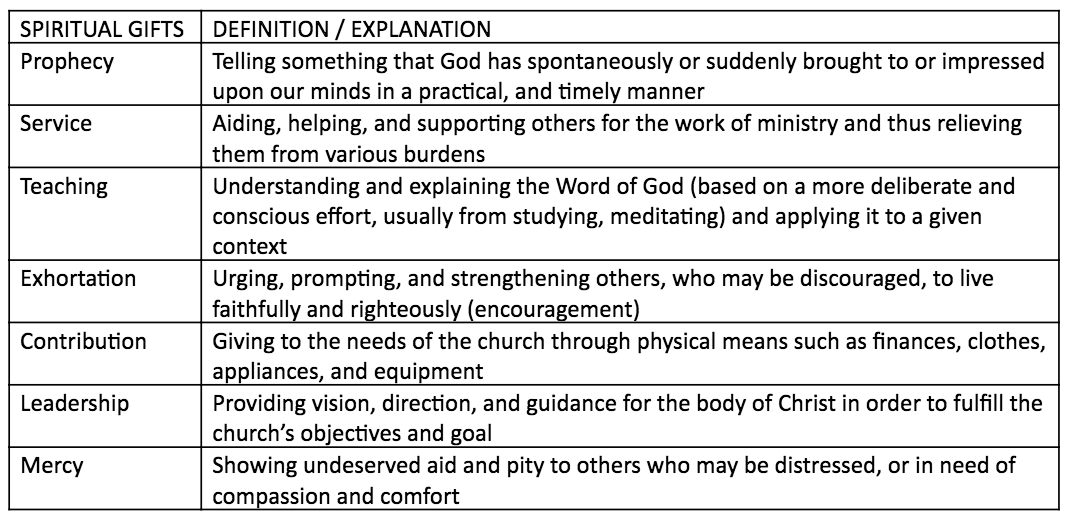
Spiritual Worship
Romans 12:1-8
Brief Comments
Introduction: Romans 12:1-15:13 is about a new kind of community based on Christ, in response to the gospel, and empowered by the Word and Spirt. This section follows Paul’s theological truths from 3:21-11:36. Because we have experienced…
- Justification (chapter 3:21-3:1)
- The blessings of the gospel (chapter 5:1-11)
- Spiritual union with Christ (chapter 6)
- Life in the Spirit (chapter 8)
- God’s call to renew the world (chapter 9)
- Salvation by Christ alone (chapter 10)
- Hope (chapter 11) …
God has now called us into a new kind of community. Just as God called Moses and Joshua into a new community, He is now likewise, calling Christ-followers into a new kind of community.
So, what are some of the key elements of this new kind of community? First, we are called to be a living and holy sacrifice (12:1-2) and to use our spiritual gifts to build up one another (12:3-8). Second, we are called to love our Christian community and our enemies (12:9-21).
Third, we are called to be virtuous citizens and loving neighbors (13:1-14). Fourth, we are called to stop hurting (judging, stumbling) one another (14:1-23). Fifth, we are called to follow Christ’s example (15:1-13).
Spiritual Worship is a Living and Holy Sacrifice
12:1: Spiritual worship is presenting ourselves to God as a living and holy sacrifice. Paul begins chapter twelve with a “therefore.” This is important because he’s connecting 12:1-8 to Romans 3:21-11:36 (see introduction above). He also highlights “the mercies of God.” Although we deserve judgment and wrath, God has given us mercy. God’s mercy is was a prevalent theme in Romans (9:15-18, 23, 9:23, 11:30-32) and throughout Scripture. Here are a few examples:
- Mercy seat (Exodus 25:17-22)
- God revealing His glory to Moses following the golden calf (Exodus 33:19)
- Mercy follows us (Psalm 23:6)
- David asking for mercy after Nathan confronts him about his adultery with Bathsheba (Psalm 51:1)
- Jesus’ parable of the good Samaritan loving his neighbor (Luke 10:25-37)
- God’s mercy plays a role in electing/choosing people in Christ (Romans 9:15-9:23; 11:30-32)
- God is rich is mercy (Ephesians 2:4)
- Saved according to God’s mercy (Titus 3:5)
- Mercy triumphs over judgment (James 2:13)
- Spiritually born again according to mercy (1 Peter 1:3)
- Becoming God’s people by receiving mercy (1 Peter 2:10)
Based on God’s mercy (which leads to our salvation), Christians are called to present our bodies as a living and holy sacrifice to God. Thus, our spiritual worship is based on and in response to God’s mercy. Pate explains the significance: “First, by his use of the verb offer…offer is a continuous action, a daily occurrence. Second, bodies include the whole person. Third, living sacrifice…is living in a spiritual dimension—those alive spiritually in Christ.” (236)
Our daily living should be “holy and acceptable to God.” One the one hand, we strive to pursue holiness because God’s call to commitment is a holy calling. On the other hand, we give praise to God because we are only “holy and acceptable to God” because Jesus’ righteousness has been credited to us.
Thus, everything that we do (thoughts, emotions, words, actions) or don’t do (but should do: the absence of holy living) constitutes our “spiritual worship” to God. Spiritual worship is not only what we do during Sunday worship service (though it includes it). Spiritual worship is what we do with our bodies wherever we go and in whatever we do.
Spiritual Worship is Transformation (12:2-4)
12:2: Spiritual worship includes transformation. We can be transformed by the world (conformed by it) or we can be transformed by renewing our minds. This is part of the eschatological truth of “already, but not yet.”
On the one hand, we “already” experience the power of kingdom, but on the other hand, its full manifestation is still “not yet” here (future). Taken in another sense, we may also say that Christians are living in theological tension: this present age (the world) vs the age to come.
What are some of the ways that this present age—the world molds us into its image? Let me suggest four ways: (1) the world lies to us, (2) the world tempts us, (3) the world indoctrinates us, and (4) the world ridicules us.
In order to counteract this tendency to conform to the world, Paul exhorts us to be renew our minds. Because the mind is the gatekeeper of truth, knowledge, and reflection it’s imperative that we renew it. Here are four suggestions for renewing our minds.
First, we renew our minds with God’s Word (Joshua 1:8; Psalm 1:2; John 17:17; Colossians 3:16; Ephesians 6:17; Hebrews 4:12) and Spirit (Romans 8; 14:17; 15:16; 1 Corinthians 6:11; 2 Corinthians 3:18; Galatians 5:22-23; Ephesians 5:18; 1 Peter 1:2).
Second, we renew our minds by pursuing truth, rejecting lies, and unmasking deceptions. Third, we renew our minds by meditating on the good things of life (Philippians 4:8). Fourth, we renew our minds by reflecting on theological truths such as God’s greatness, God’s glory, the gospel, and our spiritual union with Christ.
What happens when we reject the ways of the world and renew our minds? According to Paul, we are able to “discern” God’s will (that which is good, acceptable, perfect).
Spiritual Worship is Using our Spiritual Gifts (12:3-8)
12:3-5: Spiritual worship is also using our spiritual gifts to serve others. Regarding “the grace given to” Paul, he’s probably referring to his call to be “the Apostle to the Gentiles.” In other words, his Apostleship gives him the authority to speak about spiritual gifts in the Christian community. Paul then shares two introductory comments about spiritual gifts.
First, we should not think too “highly” of ourselves (my spiritual gift is more important than yours) in regards to our spiritual gifts (12:3). Rather we should have “sober judgment” (sensible, reasonable). Second, God has assigned a variety of spiritual gifts because the “many members” have different needs and functions (unity and diversity).
12:6-8: Paul also writes about spiritual gifts in 1 Corinthians 12:8-10, 28 and 1 Peter 4:11. (I interpret Ephesians 4:11 as a reference to leadership roles in the book of Acts.) A spiritual gift is special “talent” or “skill” that the Spirit sovereignly and graciously imparts to every believer (everyone has at least one spiritual gift) in order to build up/edify the body of Christ for God’s glory (1 Corinthians 12:7; 14:3).
A full discussion regarding the “miraculous” or “sign” gifts is beyond this study but since the gift of prophecy would be classified as miraculous, we will briefly mention a few points. Advocates who believe that these kinds of gifts are no longer in existence usually connect it to their function.
First, these “sign” gifts were necessary in order to authenticate the gospel message in the early Church (usually connected to the apostle’s work) (Hebrews 2:3-4; Ephesians 2:20). Second, the apostles had these unique sign gifts but no apostles exist today (2 Corinthians 12:12; Ephesians 4:7-11). Third, the period of Pentecost (Acts) belongs to a unique salvation history (Jesus’ death and resurrection: Luke 3; Acts 1:5; 2:32-33), but we are no longer it this same period.
In contrast to this view, I believe that all gifts are "in operation" for today for three reasons. First, they are associated with Pentecost until Christ's return (Joel 2.28-32; Acts 2.17). We are still in this “age.” Second, they cease when Christ returns (1 Corinthians 13.10-13), but Christ has not returned. Third, they build and edify the body (1 Corinthians 12.7; 14.3) and the body still needs to grow and mature.
So, how should we understand the gifts identified in this passage?
While it’s important to discuss the nature of these spiritual gifts (ceased or still exist), our focus should be on how our Christian communities identify our spiritual gifts, develop our spiritual gifts, and implement our spiritual gifts for the body of Christ.
Back
Reflection
1. What are the practical implications of presenting our bodies to God “as a living and holy sacrifice?”
2. Identify the different ways you have been conforming yourself to the ways of the world? Share.
3. How do we renew our minds?
4. Read 12:3 again. What’s the relationship between this verse and Paul’s teaching about spiritual gifts? (12:4-7)
5. Briefly explain how each spiritual gift can edify/build up our spiritual community. Why do you think there are so many different spiritual gifts?
6. What are your spiritual gifts? (Can you identify your top 3?) To what extent have you been using your spiritual gifts? If you haven’t identified your spiritual gifts please take a spiritual inventory on spiritual gifts: http://sg.pathwaycc.co/
7. Which area(s) in your life need to experience transformation? Identify practical steps for moving toward spiritual transformation. Share.

